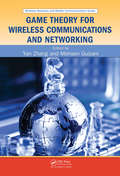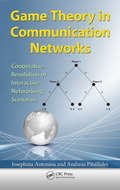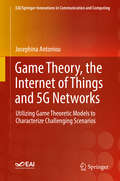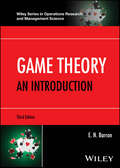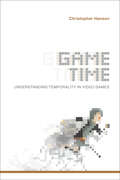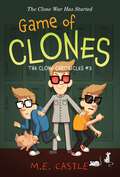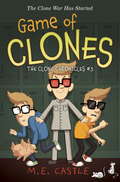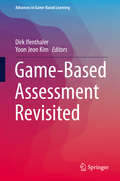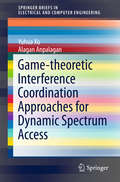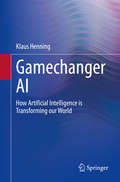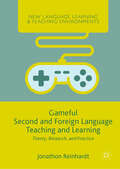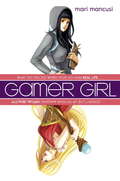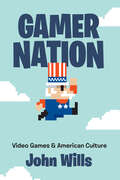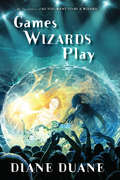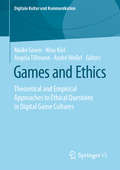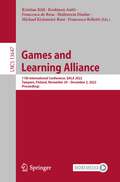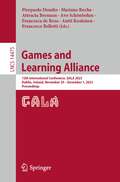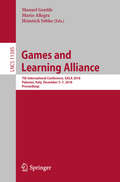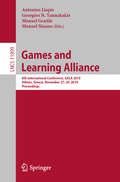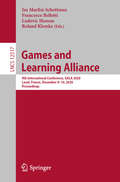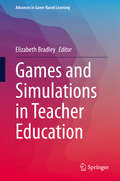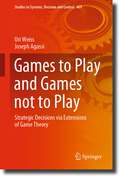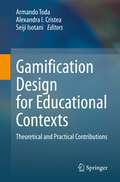- Table View
- List View
Game Theory for Next Generation Wireless and Communication Networks: Modeling, Analysis, and Design
by Tamer Başar Zhu Han Dusit Niyato Walid SaadDiscover the very latest game-theoretic approaches for designing, modeling, and optimizing emerging wireless communication networks and systems with this unique text. Providing a unified and comprehensive treatment throughout, it explains basic concepts and theories for designing novel distributed wireless networking mechanisms, describes emerging game-theoretic tools from an engineering perspective, and provides an extensive overview of recent applications. A wealth of new tools is covered - including matching theory and games with bounded rationality - and tutorial chapters show how to use these tools to solve current and future wireless networking problems in areas such as 5G networks, network virtualization, software defined networks, cloud computing, the Internet of Things, context-aware networks, green communications, and security. This is an ideal resource for telecommunications engineers, and researchers in industry and academia who are working on the design of efficient, scalable, and robust communication protocols for future wireless networks, as well as graduate students in these fields.
Game Theory for Wireless Communications and Networking (Wireless Networks And Mobile Communications Ser.)
by Yan Zhang Mohsen GuizaniThis comprehensive technical guide explains game theory basics, architectures, protocols, security, models, open research issues, and cutting-edge advances and applications. Describing how to employ game theory in infrastructure-based wireless networks and multihop networks to reduce power consumption, it facilitates quick and easy reference to related optimization and algorithm methodologies. The book explains how to apply the game theoretic model to address resource allocation, congestion control, attacks, routing, energy management, packet forwarding, and MAC.
Game Theory in Communication Networks: Cooperative Resolution of Interactive Networking Scenarios
by Josephina Antoniou Andreas PitsillidesFocusing on heterogeneous networks, this book addresses important resource management and security issues found in networks and uses theoretical tools to model them. Although it explores network design and management from the perspective of game theory and graph theory, the text also provides practical solutions for each mechanism that needs improvement with a step-by-step approach. It also includes simulation code, so readers can use some or all of the proposed models for better network planning.
Game Theory in Wireless and Communication Networks
by Tamer Başar Zhu Han Dusit Niyato Walid Saad Are HjørungnesThis unified treatment of game theory focuses on finding state-of-the-art solutions to issues surrounding the next generation of wireless and communications networks. Future networks will rely on autonomous and distributed architectures to improve the efficiency and flexibility of mobile applications, and game theory provides the ideal framework for designing efficient and robust distributed algorithms. This book enables readers to develop a solid understanding of game theory, its applications and its use as an effective tool for addressing wireless communication and networking problems. The key results and tools of game theory are covered, as are various real-world technologies including 3G networks, wireless LANs, sensor networks, dynamic spectrum access and cognitive networks. The book also covers a wide range of techniques for modeling, designing and analysing communication networks using game theory, as well as state-of-the-art distributed design techniques. This is an ideal resource for communications engineers, researchers, and graduate and undergraduate students.
Game Theory, the Internet of Things and 5G Networks: Utilizing Game Theoretic Models to Characterize Challenging Scenarios (EAI/Springer Innovations in Communication and Computing)
by Josephina AntoniouThis book shows how to model selected communication scenarios using game theory. The book helps researchers specifically dealing with scenarios motivated by the increasing use of the Internet of Things (IoT) and 5G Communications by using game theory to approach the study of such challenging scenarios. The author explains how game theory acts as a mathematical tool that models decision making in terms of strategies and mechanisms that can result in optimal payoffs for a number of interacting entities, offering often antagonistic behaviors. The book explores new technologies in terms of design, development and management from a theoretical perspective, using game theory to analyze strategic situations and demonstrate profitable behaviors of the cooperative entities. The book identifies and explores several significant applications/uses/situations that arise from the vast deployment of the IoT. The presentation of the technological scenarios is followed in each of the first four chapters by a step-by-step theoretical model often followed by equilibrium proof, and numerical simulation results, that are explained in a tutorial-like manner. The four chapters tackle challenging IoT and 5G related issues, including: new security threats that IoT brings, e.g. botnets, ad hoc vehicular networks and the need for trust in vehicular communications, content repetition by offloading traffic onto mobile users, as well as issues due to new wearable devices that enable data collection to become more intrusive.
Game Theory: An Introduction (Wiley Series in Operations Research and Management Science #1)
by E. N. BarronAuthoritative and quantitative approach to modern game theory with applications from areas including economics, political science, computer science, and engineering Game Theory acknowledges the role of mathematics in making logical and advantageous decisions in adversarial situations and provides a balanced treatment of the subject that is both conceptual and applied. This newly updated and revised Third Edition streamlines the text to introduce readers to the basic theories behind games in a less technical but still mathematically rigorous way, with many new real-world examples from various fields of study, including economics, political science, military science, finance, biological science, and general game playing. The text introduces topics like repeated games, Bayesian equilibria, signaling games, bargaining games, evolutionary stable strategies, extensive games, and network and congestion games, which will be of interest across a wide range of disciplines. Separate sections in each chapter illustrate the use of Mathematica and Gambit software to create, analyze, and implement effective decision-making models. A companion website contains the related Mathematica and Gambit data sets and code. Solutions, hints, and methods used to solve most problems to enable self-learning are in an Appendix. Game Theory includes detailed information on: The von Neumann Minimax Theorem and methods for solving any 2-person zero sum matrix game. Two-person nonzero sum games solved for a Nash Equilibrium using nonlinear programming software or a calculus method. Nash Equilibria and Correlated Equilibria. Repeated games and punishment strategies to enforce cooperation Games in Extensive Form for solving Bayesian and perfect information games using Gambit. N-Person nonzero sum games, games with a continuum of strategies and many models in economics applications, duels, auctions, of Nash Equilibria, and the Stable Matching problem Coalitions and characteristic functions of cooperative games, an exact nucleolus for three-player games, bargaining Game theory in evolutionary processes and population games A trusted and proven guide for students of mathematics, engineering, and economics, the Third Edition of Game Theory is also an excellent resource for researchers and practitioners in economics, finance, engineering, operations research, statistics, and computer science.
Game Time: Understanding Temporality in Video Games (Digital Game Studies)
by Christopher HansonPausing, slowing, rewinding, replaying, reactivating, reanimating . . . Has manipulating video game timelines altered our experience of time? “Compelling.” —ChoiceVideo game scholar Christopher Hanson argues that the mechanics of time in digital games have presented a new model for understanding time in contemporary culture, a concept he calls “game time.” Multivalent in nature, game time is characterized by apparent malleability, navigability, and possibility while simultaneously being highly restrictive and requiring replay and repetition. When compared to analog tabletop games, sports, film, television, and other forms of media, Hanson demonstrates, the temporal structures of digital games provide unique opportunities to engage players with liveness, causality, potentiality, and lived experience that create new ways of experiencing time.Features comparative analysis of key video games titles—including Braid, Quantum Break, Battle of the Bulge, Prince of Persia: The Sands of Time, Passage, The Legend of Zelda: The Ocarina of Time, Lifeline, and A Dark Room.“The text is well-researched, and the introduction is an excellent, focused overview of video game studies.” —Choice
Game of Clones (The Clone Chronicles #3)
by M. E. CastleThe third installment in the hilarious middle-grade adventure series The Clone Chronicles. Fisher Bas was able to track down his gone-Hollywood Clone—Two—but only with the help of Amanda Cantrell. Now "Three" and Dr. X remain on the loose. If Fisher is going to stop his secret from coming out, he'll have to figure out a cover for his brother clone and keep Three from helping Dr. X take over the world. That proves much harder as Fisher is no longer able to keep Two a secret and crazy things start happening at Wompalog Middle School. Turns out Three has come to Palo Alto bent on eliminating Fisher and Two. The boys will have to pull together their friends and an unlikely ally to stop Three and his clone army. The future of Fisher and Two's hometown depends on it.
Game of Clones: The Clone Chronicles #3
by M. E. Castle"A funny James Bond for the middle school set," Game of Clones mixes Alex Rider and Michael Buckley's NERD series into the ideal formula for a third installment in the hilarious and rollicking middle-grade adventure series The Clone Chronicles. Fisher Bas was able to track down his gone-Hollywood Clone--Two--but only with the help of Amanda Cantrell. Now "Three" and Dr. X remain on the loose. If Fisher is going to stop his secret from coming out, he'll have to figure out a cover for his brother clone and keep Three from helping Dr. X take over the world.That proves much harder as Fisher is no longer able to keep Two a secret and crazy things start happening at Wompalog Middle School. Turns out Three has come to Palo Alto bent on eliminating Fisher and Two. The boys will have to pull together their friends and an unlikely ally to stop Three and his clone army. The future of Fisher and Two's hometown depends on it.
Game-Based Assessment Revisited (Advances in Game-Based Learning)
by Dirk Ifenthaler Yoon Jeon KimThe capabilities and possibilities of emerging game-based learning technologies bring about a new perspective of learning and instruction. This, in turn, necessitates alternative ways to assess the kinds of learning that are taking place in the game-based environments. The field has been broadening the focus of assessment in game environments (i.e., what we measure), developing processes and methodologies that go beyond psychometrics practices (i.e., how we go about assessment in games), and implementing the game-based assessment (GBA) in real contexts. The current state of the field calls for a revisit of this topic to understand what we have learned from the research on this topic, and how the GBA work changed how the field thinks about assessment beyond game environments. Accordingly, this comprehensive volume covers the current state of research, methodology, and technology of game-based assessment. It features four major themes: what we are measuring in games, how GBA has influenced how people do assessment beyond games, new methods and practices, and implementations of GBA. The audience for this volume includes researchers, graduate students, teachers, and professional practitioners in the areas of education, instructional design, educational psychology, academic and organizational development, and instructional technology.
Game-theoretic Interference Coordination Approaches for Dynamic Spectrum Access
by Alagan Anpalagan Yuhua XuWritten by experts in the field, this book is based on recent research findings in dynamic spectrum access for cognitive radio networks. It establishes a game-theoretic framework and presents cutting-edge technologies for distributed interference coordination. With game-theoretic formulation and the designed distributed learning algorithms, it provides insights into the interactions between multiple decision-makers and the converging stable states. Researchers, scientists and engineers in the field of cognitive radio networks will benefit from the book, which provides valuable information, useful methods and practical algorithms for use in emerging 5G wireless communication.
Gamechanger AI: How Artificial Intelligence is Transforming our World
by Klaus HenningArtificial intelligence changes everything. This book encourages readers to consider the challenges of the digital transformation driven by Artificial Intelligence. The reader will discover why this transformation is to be regarded as the greatest cultural revolution since the invention of mass printing and how it can be shaped positively in a value-oriented way. The author pursues the thesis that intelligent objects on the internet, as well as physical objects, are attaining their own consciousness. Using many examples, he shows how these digital companions become our digital partners. This non-fiction book provides many suggestions for one's own living and working environment and is full of examples of how artificial intelligence systems can be implemented. The reader learns what is already possible today and what can be expected in the next ten to twenty years. The book is of interest to anyone interested in AI and the digital transformation - from those responsible in companies, public institutions, and in politics, to all teachers and parents who want to understand what the next generation can expect.
Gameful Second and Foreign Language Teaching and Learning: Theory, Research, and Practice (New Language Learning and Teaching Environments)
by Jonathon ReinhardtThis book offers a comprehensive examination of the theory, research, and practice of the use of digital games in second and foreign language teaching and learning (L2TL). It explores how to harness the enthusiasm, engagement, and motivation that digital gaming can inspire by adopting a gameful L2TL approach that encompasses game-enhanced, game-informed, and game-based practice. The first part of the book situates gameful L2TL in the global practices of informal learnful L2 gaming and in the theories of play and games which are then applied throughout the discussion of gameful L2TL practice that follows. This includes analysis of practices of digital game-enhanced L2TL design (the use of vernacular, commercial games), game-informed L2TL design (gamification and the general application of gameful principles to L2 pedagogy), and game-based L2TL design (the creation of digital games purposed for L2 learning). Designed as a guide for researchers and teachers, the book also offers fresh insights for scholars of applied linguistics, second language acquisition, L2 pedagogy, computer-assisted language learning (CALL), game studies, and game design that will open pathways to future developments in the field.
Gamer Girl
by Mari MancusiMaddy's life couldn't get much worse. Her parents split and now she's stuck in a small town and at a new school. Most of the time, she retreats into her manga art, but when she gets into the Fields of Fantasy online computer game, she knows she's found the one place she can be herself. In the game world, Maddy can be the beautiful and magical Allora and have a virtually perfect life. And she even finds a little romance. But can Maddy escape her real-life problems altogether, or will she have to find a way to make her real world just as amazing as her virtual one?
Gamer Nation: Video Games and American Culture
by John WillsExplores how games actively influence the ways people interpret and relate to American life.In 1975, design engineer Dave Nutting completed work on a new arcade machine. A version of Taito's Western Gun, a recent Japanese arcade machine, Nutting's Gun Fight depicted a classic showdown between gunfighters. Rich in Western folklore, the game seemed perfect for the American market; players easily adapted to the new technology, becoming pistol-wielding pixel cowboys. One of the first successful early arcade titles, Gun Fight helped introduce an entire nation to video-gaming and sold more than 8,000 units.In Gamer Nation, John Wills examines how video games co-opt national landscapes, livelihoods, and legends. Arguing that video games toy with Americans' mass cultural and historical understanding, Wills show how games reprogram the American experience as a simulated reality. Blockbuster games such as Civilization, Call of Duty, and Red Dead Redemption repackage the past, refashioning history into novel and immersive digital states of America. Controversial titles such as Custer's Revenge and 08.46 recode past tragedies. Meanwhile, online worlds such as Second Life cater to a desire to inhabit alternate versions of America, while Paperboy and The Sims transform the mundane tasks of everyday suburbia into fun and addictive challenges.Working with a range of popular and influential games, from Pong, Civilization, and The Oregon Trail to Grand Theft Auto, Silent Hill, and Fortnite, Wills critically explores these gamic depictions of America. Touching on organized crime, nuclear fallout, environmental degradation, and the War on Terror, Wills uncovers a world where players casually massacre Native Americans and Cold War soldiers alike, a world where neo-colonialism, naive patriotism, disassociated violence, and racial conflict abound, and a world where the boundaries of fantasy and reality are increasingly blurred. Ultimately, Gamer Nation reveals not only how video games are a key aspect of contemporary American culture, but also how games affect how people relate to America itself.
Games Wizards Play (Young Wizards #10)
by Diane DuaneEvery eleven years, Earth's senior wizards hold the Invitational: an intensive three-week event where the planet's newest, sharpest young wizards show off their best and hottest spells. Wizardly partners Kit Rodriguez and Nita Callahan, and Nita's sister, former wizard-prodigy Dairine Callahan, are drafted in to mentor two brilliant and difficult cases: for Nita and Kit, there’s Penn Shao-Feng, a would-be sun technician with a dangerous new take on managing solar weather; and for Dairine, there's shy young Mehrnaz Farrahi, an Iranian wizard-girl trying to specialize in defusing earthquakes while struggling with a toxic extended wizardly family that demands she perform to their expectations. Together they're plunged into a whirlwind of cutthroat competition and ruthless judging. Penn's egotistical attitude toward his mentors complicates matters as the pair tries to negotiate their burgeoning romance. Meanwhile, Dairine struggles to stabilize her hero-worshipping, insecure protégée against the interference of powerful relatives using her to further their own tangled agendas. When both candidates make it through to the finals stage on the dark side of the Moon, they and their mentors are flung into a final conflict that could change the solar system for the better . . . or damage Earth beyond even wizardly repair.
Games and Ethics: Theoretical and Empirical Approaches to Ethical Questions in Digital Game Cultures (Digitale Kultur und Kommunikation #7)
by Angela Tillmann Maike Groen Nina Kiel André WeßelThe number of digital gamers is increasing worldwide, but public debates about digital games commonly focus on questionable game content or problematic gaming behavior. This book offers a broader ethical perspective on digital game cultures, presenting theoretical and empirical work on the ethical dimensions of the development, production and distribution of digital games, as well as issues relating to responsible gaming and the pedagogical use of digital games. Questions of the communicative-cultural change in game cultures are linked with questions of media education and media ethics. With such a comprehensive approach, the volume promotes ethical discourse on digital game cultures.
Games and Learning Alliance: 11th International Conference, GALA 2022, Tampere, Finland, November 30 – December 2, 2022, Proceedings (Lecture Notes in Computer Science #13647)
by Michael Kickmeier-Rust Francesco Bellotti Francesca De Rosa Kristian Kiili Koskinen Antti Muhterem DindarThis book constitutes the refereed proceedings of the 11th International Conference on Games and Learning Alliance, GALA 2022, held in Tampere, Finland, in November/December 2022. The 27 full papers and 9 short papers were carefully reviewed and selected from 61 submissions. The papers cover a broad spectrum of topics: Serious Games and Game Design; Serious Games for Instruction; Serious Game for Digital Literacy and Numeracy; Novel Approaches and Application Domains; Taxonomies and Evaluation Frameworks.
Games and Learning Alliance: 12th International Conference, GALA 2023, Dublin, Ireland, November 29 – December 1, 2023, Proceedings (Lecture Notes in Computer Science #14475)
by Avo Schönbohm Francesco Bellotti Attracta Brennan Francesca De Rosa Pierpaolo Dondio Mariana Rocha Antti KoskinenThis LNCS volume constitutes the proceedings of 12th International Conference, GALA 2023, in Dublin, Ireland, held during November/December 2023. The 36 full papers and 13 short papers were carefully reviewed and selected from 88 submissions. The papers contained in this book have been organized into six categories, reflecting the variety of theoretical approaches and application domains of research into serious games: 1. The Serious Games and Game Design2. User experience, User Evaluation and User Analysis in Serious Games3. Serious Games for Instruction4. Serious Games for Health, Wellbeing and Social Change5. Evaluating and Assessing Serious Games Elements6. Posters
Games and Learning Alliance: 7th International Conference, GALA 2018, Palermo, Italy, December 5–7, 2018, Proceedings (Lecture Notes in Computer Science #11385)
by Manuel Gentile Mario Allegra Heinrich SöbkeThis book constitutes the refereed proceedings of the 7th International Conference on Games and Learning Alliance, GALA 2018, held in Palermo, Italy, in December 2018.The 38 revised regular papers presented together with 9 poster papers were carefully reviewed and selected from 68 submissions. The papers cover the following topics: games for skills training; game design; methods and tools; gamification and innovative game approaches.
Games and Learning Alliance: 8th International Conference, GALA 2019, Athens, Greece, November 27–29, 2019, Proceedings (Lecture Notes in Computer Science #11899)
by Georgios N. Yannakakis Antonios Liapis Manuel Gentile Manuel NinausThis book constitutes the refereed proceedings of the 8th International Conference on Games and Learning Alliance, GALA 2019, held in Athens, Greece, in November 2019. The 38 regular papers presented together with 19 poster papers were carefully reviewed and selected from 76 submissions. The papers cover the following topics: serious game design and pedagogical foundations; AI and technology for SG; gamification; applications and case studies; and posters.The chapter "Cyber Chronix, Participatory Research Approach to Develop and Evaluate a Storytelling Game on Personal Data Protection Rights and Privacy Risks" is available open access under a CC BY 4.0 license at link.springer.com.
Games and Learning Alliance: 9th International Conference, GALA 2020, Laval, France, December 9–10, 2020, Proceedings (Lecture Notes in Computer Science #12517)
by Iza Marfisi-Schottman Francesco Bellotti Ludovic Hamon Roland KlemkeThis book constitutes the refereed proceedings of the 9th International Conference on Games and Learning Alliance, GALA 2020, held in Laval, France, in December 2020. The 35 full papers and 10 short papers were carefully reviewed and selected from 77 submissions. The papers cover a broad spectrum of topics: Serious Game Design; Serious Game Analytics; Virtual and Mixed Reality Applications; Gamification Theory; Gamification Applications; Serious Games for Instruction; and Serious Game Applications and Studies.
Games and Simulations in Teacher Education (Advances in Game-Based Learning)
by Elizabeth BradleyThis book includes more than twenty computer games and simulations for use in teacher training. Each of these simulations is innovative and presents an opportunity for pre-service teachers to have hands-on experience in an area of need prior to teaching in the classroom. Information on the simulation origins, including theoretical underpinnings, goals, characteristics, relevant research/program evaluation results, discussion of benefits and limitations as well as dissemination, recommended use, scope of practice, etc. of each game or simulation are included. Pre-service and new teachers will gain a number of useful skills through completion of these simulations and higher education faculty and administrators will gain a plethora of research-based and effective training tools for use in their teacher training programs.
Games to Play and Games not to Play: Strategic Decisions via Extensions of Game Theory (Studies in Systems, Decision and Control #469)
by Joseph Agassi Uri WeissThis book contributes to the theoretical discussions of equilibria that rest on error―in which we include mistaken choices of games to play. Extant game theory recommends diverse strategies (plans of actions) for various given games, particularly those in Nash equilibria, in which no player benefits from one-sided strategy alteration. The literature also refers to the design of games that fit given goals. This is the mechanism design theory; its function is to serve social planners ignorant of the preferences of the people intended to play them.Our study of games avoidance adds to game theory the meta-game of choosing what game to play and what game to avoid playing, and that both players and planners can generate. This comprises a shift from the maximalist position that aims to maximize possible profit to the minimalist one that aims at minimizing possible loss. This shift depends on the question, considering the public interest, what set of games is it advisable to encourage? Obviously, it is advisable to encourage playing some groups of games such as trade, as well as to discourage playing other groups of games such as wars. This shift makes the theory much more applicable to social science: usually, choosing what game to play is less practical than choosing what game not to play. This invites legislation and similar incentives; their study should aim at the improvement of their usefulness.Discussing the possibility of changing both game and strategy renders game theory part-and-parcel of social science. For this mathematical models will not do: it requires a clear distinction between describing options and explaining situations. Explanations may enhance efforts at improvement.
Gamification Design for Educational Contexts: Theoretical and Practical Contributions
by Alexandra I. Cristea Seiji Isotani Armando TodaHave you ever wondered how to best add game-like elements to your (online) courses? What makes some game features desirable, and others boring? This book covers gamification design in educational domains. It is aimed at practitioners, researchers and academics alike. Gamification design is a recent and relevant topic in many domains; however, it is not well explored in the domain of education, with only a few frameworks available and most of these being only academic (e.g., theoretical) and not addressing practical issues related to education practitioners (e.g., teachers and instructors). The book is divided into 3 parts, in part 1 we explain some basic concepts related to gamification and gamification design, its importance for the education domain, possible negative effects if gamification design is neglected, and aspects that are still not encompassed by this field. Following, part 2 focus on explaining data-driven gamification design concepts as well as a research framework on how to use data mining algorithms to analyze and interpret data to generate strategies that can be used in education domain. It also presents a conceptual framework on how to apply those strategies in the education domain, focusing on the teacher and instructor; Finally, part 3 presents discussions regarding the concepts covered in the book, as well as possible research directions

